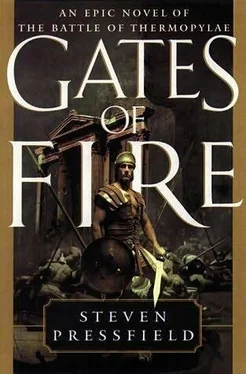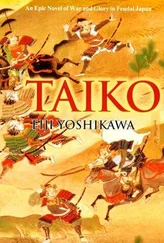Steven Pressfield - Gates of Fire - An Epic Novel of the Battle of Thermopylae
Здесь есть возможность читать онлайн «Steven Pressfield - Gates of Fire - An Epic Novel of the Battle of Thermopylae» весь текст электронной книги совершенно бесплатно (целиком полную версию без сокращений). В некоторых случаях можно слушать аудио, скачать через торрент в формате fb2 и присутствует краткое содержание. Жанр: Историческая проза, на английском языке. Описание произведения, (предисловие) а так же отзывы посетителей доступны на портале библиотеки ЛибКат.
- Название:Gates of Fire: An Epic Novel of the Battle of Thermopylae
- Автор:
- Жанр:
- Год:неизвестен
- ISBN:нет данных
- Рейтинг книги:3 / 5. Голосов: 1
-
Избранное:Добавить в избранное
- Отзывы:
-
Ваша оценка:
- 60
- 1
- 2
- 3
- 4
- 5
Gates of Fire: An Epic Novel of the Battle of Thermopylae: краткое содержание, описание и аннотация
Предлагаем к чтению аннотацию, описание, краткое содержание или предисловие (зависит от того, что написал сам автор книги «Gates of Fire: An Epic Novel of the Battle of Thermopylae»). Если вы не нашли необходимую информацию о книге — напишите в комментариях, мы постараемся отыскать её.
Gates of Fire: An Epic Novel of the Battle of Thermopylae — читать онлайн бесплатно полную книгу (весь текст) целиком
Ниже представлен текст книги, разбитый по страницам. Система сохранения места последней прочитанной страницы, позволяет с удобством читать онлайн бесплатно книгу «Gates of Fire: An Epic Novel of the Battle of Thermopylae», без необходимости каждый раз заново искать на чём Вы остановились. Поставьте закладку, и сможете в любой момент перейти на страницу, на которой закончили чтение.
Интервал:
Закладка:
Along the mountain face to the left, three stones, each at twice the height of a man so they could be seen above the dust of battle, had been selected as benchmarks.
Lizard Stone, so named for a particularly fearless fellow of that species who took his sun thereupon, stood farthest forward of the Phokian Wall, closest to the Narrows, perhaps a hundred and fifty feet from the actual mouth of the pass. This was the line to which the enemy would be permitted to advance. It had been determined by trial with our own men that a thousand of the foe, densely packed, could fit between this demarcation and the Narrows. A thousand, Leonidas had ordered, will be invited to the dance. There, at Lizard Stone, they will be engaged and their advance checked.
Crown Stone, second of the three and another hundred feet rearward of Lizard, defined the line at which each relief detachment would marshal, immediately before being hurled into the fray.
Lion Stone, rearmost of the three and directly in front of the Wall, marked the waiting line-the runners' chute, at which each relief unit would marshal, leaving enough space between itself and those actually fighting for the rear ranks of the combatants to maneuver, to give ground if necessary, to rally, for one flank to support another and for the wounded to be withdrawn. Along this demarcation the Spartans, Mycenaeans and Phliasians now took their stations. Dress the line! the polemarch Olympieus bellowed. Close up your interval! He prowled before the front, disdaining the drizzle of arrows, shouting to his platoon commanders, who relayed the orders to their men.
Leonidas, out farther still before Olympieus, surveyed the roiling, dust-choked struggle ahead at the Narrows. The sound, if anything, had increased. The clash of sword and spear upon shield, the ringing bell-like toll of the bowl-shaped bronze, the cries of the men, the sharp cracking explosions as lances shivered under impact and snapped in two; all echoed and reverberated between the mountain face and the Narrows like some theatron of death circumvallated within its own stone amphitheater. Leonidas, still garlanded, with his helmet up, turned and signaled to the polemarch. Shields to rest! Olympieus' voice boomed. Along the Spartan line, aspides were lowered and set upright upon the earth, top rims balanced against each man's thigh, with the shield's forearm sheath and gripcord ready to hand. All helmets were up, each man's face still exposed. Beside Dienekes, his captain-of-eight, Bias, was hopping like a flea. This is it, this is it, this is it.
Steady, gentlemen. Dienekes stepped forward to let his men see him. Rest those cheeseplates. In the third rank Ariston, beside himself with agitation, yet clutched his shield at port. Dienekes reached through and whacked him with the flat of his lizard-sticker. Are you showing off? The youth snapped to, blinking like a boy awoken from a nightmare. For a full heartbeat you could see he had no idea who Dienekes was or what he wanted. Then, with a start and a sheepish expression, he recovered himself and lowered his shield to position of rest against his knee.
Dienekes prowled before the men. All eyes on me! Here, brothers! His voice penetrated, hard and throaty, carrying with the hoarse bark all combatants know when their tongue turns to leather. Look at me, don't look at the fighting!
The men tore their eyes from the flood and ebb of murder which was taking place a stone's lob in front of them. Dienekes stood before them, his back to the enemy. This is what's happening, a blind man could tell just from the sound. Dienekes' voice carried despite the din from the Narrows. The enemy's shields are too small and too light. They can't protect themselves. The Thespians are carving them up. The men's glances kept tearing away toward the struggle. Look at me! Put your lamps here, goddamn you! The enemy hasn't broken yet. They feel their King's eyes upon them. They're falling like wheat but their courage hasn't failed. I said, look at me! In the killing zone, you see our allies' helmets now, rising out of the slaughter; it seems as if the Thespians are mounting a wall. They are. A wall of Persian bodies.
This was true. Distinctly could be beheld a rise of men, a wave of its own within the boiling melee. The Thespians will only last a few more minutes. They're exhausted from killing. It's a grouse shoot. Fish in a net. Listen to me! When our turn comes, the enemy will be ready to cave.
I can hear him cracking now. Remember: we're going in for a boxer's round. In and out. Nobody dies. No heroes. Get in, kill all you can, then get out when the trumpets sound.
Behind the Spartans, on the Wall, which had been filled with the third wave of Tegeates and Opountian Lokrians twelve hundred strong, the wail of the Alpine cut the din. Out front, Leonidas raised his spear and tugged his helmet down. You could see Polynikes and the Knights advance to envelop him. The Thespians' round was over. Hats down! Dienekes bellowed. Cheeseplates up!
The Spartans came in frontally, eight deep, at a double interval, allowing the Thespian rearmen to withdraw between their files, man by man, one rank at a time. There was no order to it; the Thespians just dropped from exhaustion; the Lakedaemonian tread rolled over them. When the Spartan promachoi, the forerankers, got within three shields of the front, their spears began plunging at the foe over the allies' shoulders. Many of the Thespians just dropped and let themselves be trampled; their mates pulled them to their feet once the line had passed over them.
Everything Dienekes had said proved true. The Medes' shields were not only too light and too small, but their lack of mass prevented them from gaining purchase against the Hellenes' wide and weighty, bowl-shaped aspides. The enemy's targeteer shields slid off the convex fronts of the Greeks', deflecting up and down, left and right, exposing their bearers' necks and thighs, throats and groins. The Spartans struck overhand with their spears, again and again into the faces and gorges of the enemy. The Medes' armament was that of skirmishers, of lightly armed warriors of the plains, whose role was to strike swiftly, from beyond range of spear thrust, dealing death at a distance. This dense-packed phalanx warfare was hell on them.
And yet they stood. Their valor was breathtaking, beyond reckless to the point of madness. It became sacrifice, pure and simple; the Medes gave up their bodies as if flesh itself were a weapon. In minutes the Spartans, and no doubt the Mycenaeans and Phliasians as well, though I couldn't see them, were beyond exhaustion. Simply from killing. Simply from the arm's thrust of the spear, the shoulder's heave of the shield, the thunder of blood through the veins and the hammering of the heart within the breast. The earth grew, not Uttered with enemy bodies, but piled with them. Stacked with them. Mounded with them.
At the heels of the Spartans, their squires abandoned all thought of inflicting casualties with their own missile weapons, turning to nothing but dragging out trampled corpses of the foe to help their men maintain footing. I saw Demades, Ariston's squire, slit three wounded Medes' throats in fifteen seconds, slinging their carcasses back onto a mound already writhing with groaning men.
Discipline had broken among the Median forerankers; officers' bawled orders could not be heard amid the din, and even if they could, the men were so overwhelmed in the crush they could not respond to them. Still the rank and file had not panicked. In desperation they cast aside bows, lances and shields and simply grappled with bare hands onto the weapons of the Spartans. They clutched at spears, hanging on with both hands and struggling to wrest them from the Spartans' grips. Others of the foe flung themselves bodily onto the Lakedaemonians' shields, clasping the top rim and pulling the bowls of the aspides down, scratching and clawing at the Spartans with fingers and fingernails.
Читать дальшеИнтервал:
Закладка:
Похожие книги на «Gates of Fire: An Epic Novel of the Battle of Thermopylae»
Представляем Вашему вниманию похожие книги на «Gates of Fire: An Epic Novel of the Battle of Thermopylae» списком для выбора. Мы отобрали схожую по названию и смыслу литературу в надежде предоставить читателям больше вариантов отыскать новые, интересные, ещё непрочитанные произведения.
Обсуждение, отзывы о книге «Gates of Fire: An Epic Novel of the Battle of Thermopylae» и просто собственные мнения читателей. Оставьте ваши комментарии, напишите, что Вы думаете о произведении, его смысле или главных героях. Укажите что конкретно понравилось, а что нет, и почему Вы так считаете.












